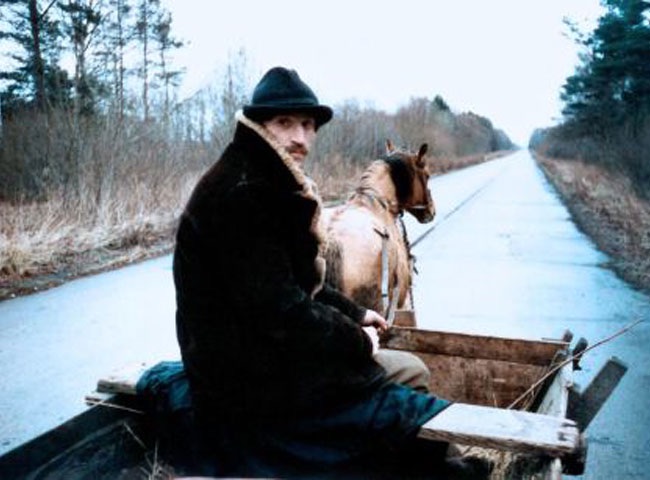Froide Patrie
-
Réalisé par Volker Koepp • Écrit par Michael Elle, Volker Koepp
-
Allemagne • 1995 • 152 minutes • 35 mm • Couleur
- Réalisation :
Volker Koepp - Écriture :
Volker Koepp, Michael Elle - Image :
Thomas Plenert - Son :
Uve Haußig (Haussig) - Montage :
Angelika Arnold, Heide Hans - Musique originale :
Mario Peters
- Production (structure) :
Dokfilm - Coproduction :
DEFA-Stiftung - Ayant droit :
Dokfilm
- N° ISAN :
non renseigné
Résumé
"Kaliningrad. Ancienne partie du puissant Etat d'Allemagne du Nord au XVIe siècle, la Prusse-Orientale fut partagée entre l'URSS et la Pologne en 1945. Sa capitale Königsberg devient Kaliningrad. A travers les témoignages de ses habitants, Volker Koepp esquisse le portrait d'une population composite. Polonais, Lituaniens, Russes, Allemands, mais aussi Kazakhes et Arméniens, tous victimes de migrations forcées et déracinements douloureux. Au bord de la mer Baltique, la Prusse, cet ancien état d’Allemagne au XVIe siècle, dépossédé de la moitié de son territoire par les guerres napoléoniennes, retrouva sa puissance au XIXe siècle avec Guillaume 1er. Mais au sortir de la guerre en 1945, ce territoire fut divisé en la Prusse-Occidentale, une province de l’ancienne Prusse restituée à la Pologne, et en la Prusse-Orientale, qui, elle, se vit partagée entre l’U.R.S.S. et la Pologne. Sa capitale, Königsberg, devient Kaliningrad.
Le considérable travail de Volker Koepp consiste à dégager dans cette lointaine province tout à la fois des portraits singuliers de différentes personnes et à esquisser un état des lieux de la mentalité collective d’une population composite. Car ces gens viennent de cultures, de langues, d’expériences différentes. Polonais, Lituaniens, Russes, Allemands, mais aussi Kazakhes et Arméniens, ils sont les témoins, les victimes, de marchandages territoriaux et politiques qui impliquèrent migrations forcées et déracinements douloureux.Telle cette Allemande évacuée en 1944 de sa Prusse natale par les Soviétiques et qui retourne sur les terres de sa culture pour montrer au cinéaste la maison de son enfance. Ce qui frappe alors l’attention est la sérénité de cette femme qu’aucune violence n’anime, aucune revendication ni agressivité. En elle, comme en nombre d’autres personnes rencontrées par Volker Koepp, bat une respiration profonde, une désillusion lucide et une espèce de sagesse désabusée, forgées par les aléas de l’Histoire."
(Jean Perret - Visions du Réel 2008)
"It’s a story about a country on the edge of Europe, bordered by the Baltic Sea and lashed by the north winds. Once a powerful state of northern Germany in the 16th Century, dispossessed of half its territory during the Napoleonic Wars, it regained its power in the 19th Century under William I.
But at the end of the war in 1945 the territory was divided into West Prussia - a province of former Prussia and handed over to Poland - and East Prussia which was split between the USSR and Poland. The latter’s capital, Königsberg, became Kaliningrad.
Volker Koepp’s remarkable undertaking has been both to reveal unique portraits of different people and to present a rough illustration of the collective psychology of a composite population. The people up there come from different cultures, language backgrounds and experiences. Poles, Lithuanians, Russians, but also Kazakhs and Armenians, they are the witnesses, objects and victims of territorial and political bartering which has resulted in forced migrations and painful uprootings.
Such as the German woman evacuated in 1944 from her native Prussia by the Russians, who returns to the homeland of her memories to show the film-maker her childhood home. One is struck by the serenity of this woman who harbours no thoughts of violence, resentfulness or agression. Just like a number of other people that Volker Koepp met, she betrays an undercurrent of lucid disillusionment and a sort of disenchanted wisdom which has been built-up over forced journeys and the imposed contact with alien cultures.
But it takes the tenacity and the psychological subtlety of a filmmaker who has been well-versed in the wide variey of film-making processes to manage to depict the portraits of the characters in this story, connected to so many true and symbolic tales of the daily violence dealt out in the name of state machinations. The faces and the voices of the old and young alike constitute the landscape of memory and ambition and never seem alien since Volker Koepp takes time, brilliantly, to meet them. As echoes of these presences, the recurrent images of the sea, storks darting across the sky, the wind and rain that lash the countryside, winter and summer, lend a paradoxically epic dimension to a story that has become bogged-down and forgotten, whose walls and roofs bear the scars of the wounds of time past and endlessly rebegun." (Jean Perret - in catalogue Visions du Réel, 2008)
À propos du film
Sélections et distinctions
- 1996 • Festival international du film de Berlin - Berlinale • Berlin (Allemagne) • Sélection
- 1995 • Visions du Réel • Nyon (Suisse) • Prix du public
Comment avoir accès au film ?
- Édition DVD
-
Accès VOD
- Il n'existe pas d'accès en VOD à notre connaissance
- Distribution
- Aide sur les moyens d'accéder à un film

